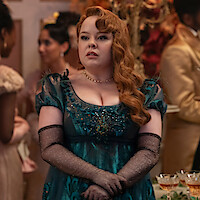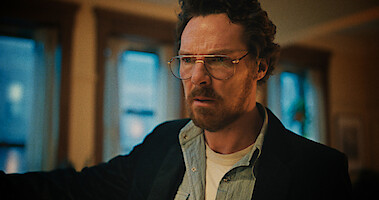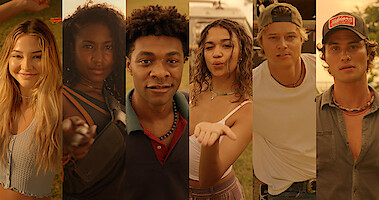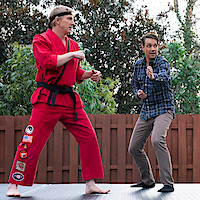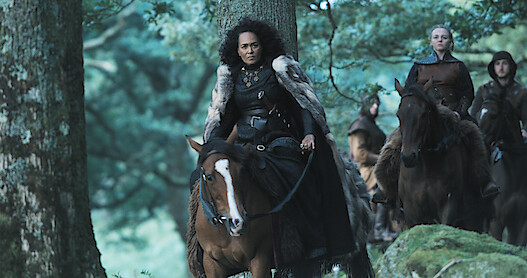
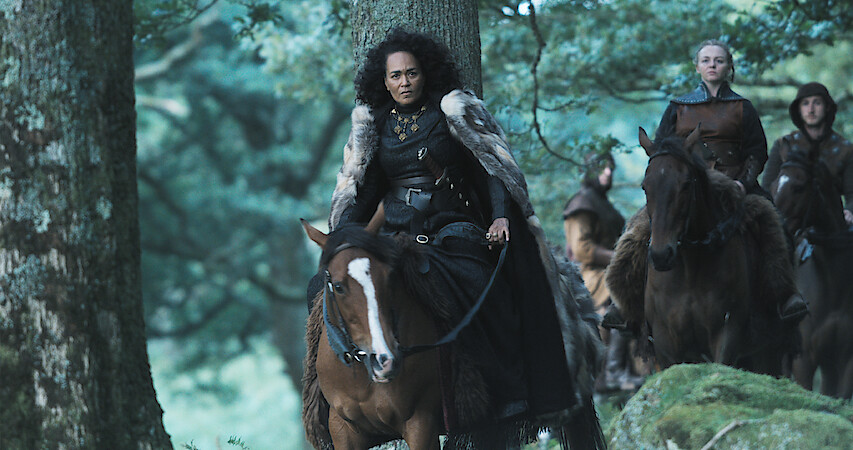
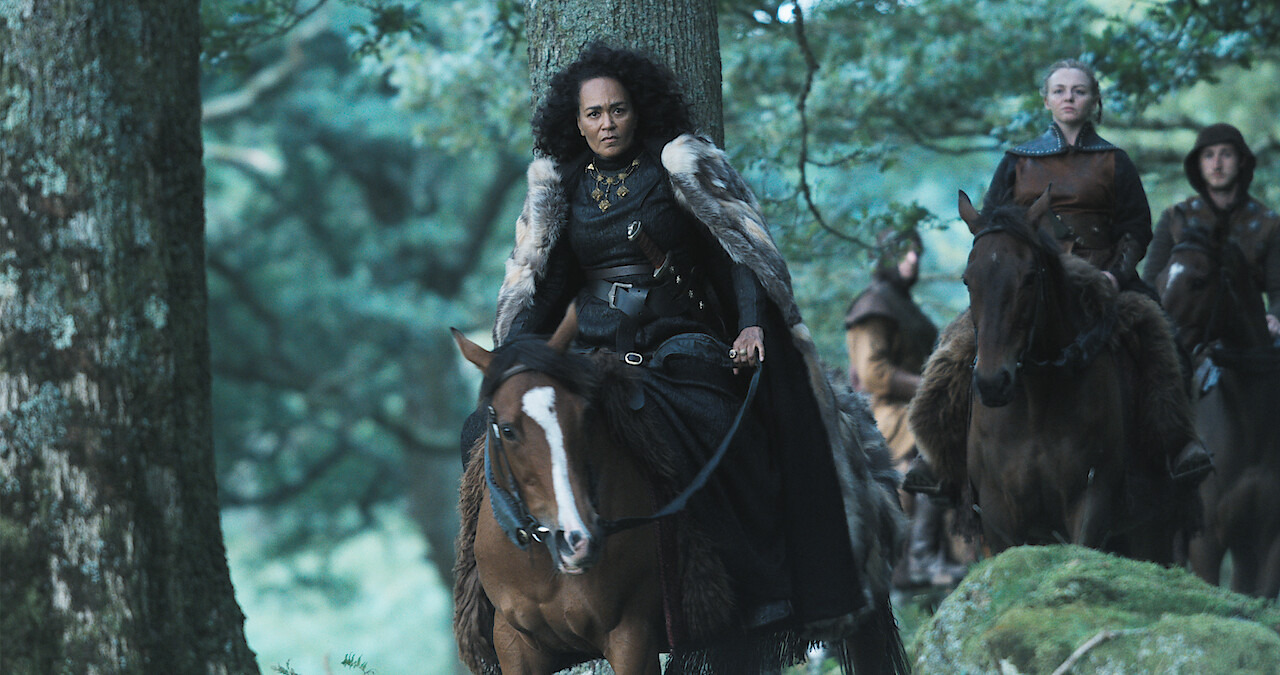



In the new series Vikings: Valhalla, the diverse city of Kattegat might seem like an outlier to those who aren’t familiar with Viking history. But fact is closer than fiction. In the show, a war rages between the Vikings and the English over political indifferences rooted in intolerance of religious worship and other cultural practices. In the midst of the fray is a seaside province ruled by Jarl Estrid Haakon, a Black Scandinavian ruler who manages to strike a balance between the tense intermingling of religions and the vibrant intercultural exchanges in the port city's open-air marketplace. In real life, and as depicted on the show, Vikings often traveled and settled down all around the globe in the Middle Ages, stretching across Constantinople, Russia, North Africa, Spain and even Canada. While other characters are based on real people, Estrid Haakon is an invented character, whose Viking grandfather met her royal African grandmother while in the great trading city of Alexandria, Egypt. They fell in love and returned to Kattegat, eventually passing on ruling duties to her.
“I can really relate to Jarl Haakon,” singer-actor Caroline Henderson, who channeled her own multicultural heritage in playing the royal leader, tells Tudum. “As a child, I was a little bit confused, I must admit, but I think I can really relate to her. I am Jarl Estrid Haakon, just a thousand years on.”
The common vision of Vikings has seldom included the truth, that the transnational empire was more diverse than modern media often depicts. “The Vikings were not a necessarily homogeneous, fully white group of people; they were multicultural and multiracial,” says series creator Jeb Stuart. “The Vikings went all over the globe: We know, from DNA evidence, that there’s Viking DNA all around what we considered the known world in the Middle Ages; we know that they were in Palestine and Constantinople.”
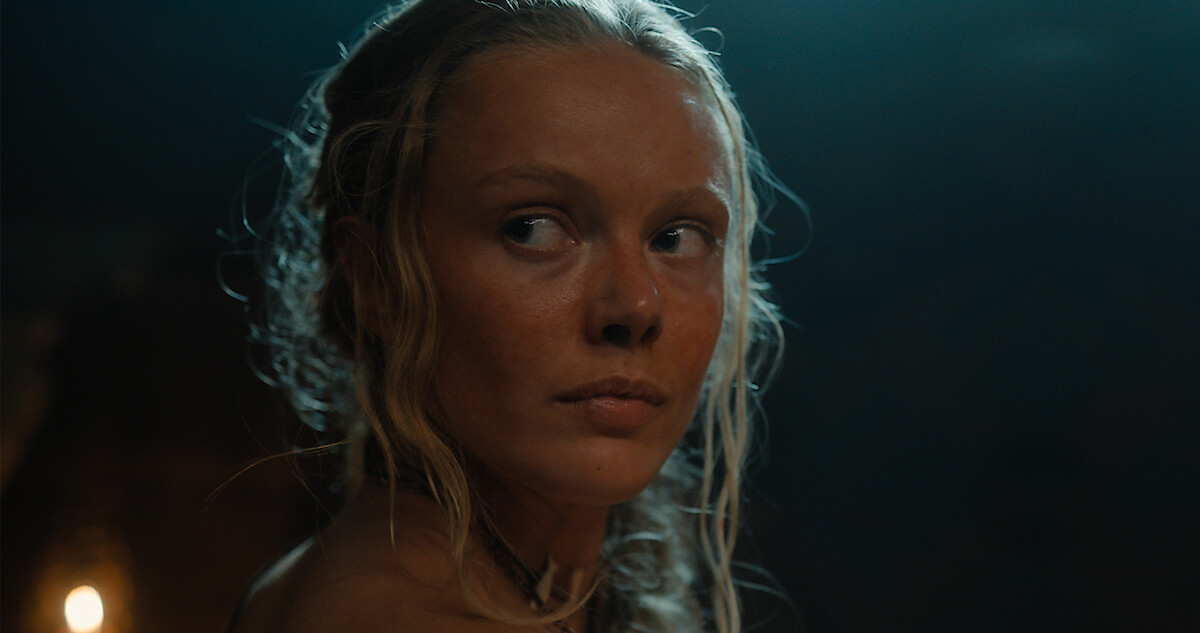
These findings added textures to the way Vikings: Valhalla depicts a multicultural world. “We actually know through science that [Vikings] were really travelers, and, of course, they mixed cultures and babies and knowledge and foods and slaves,” says Henderson.
Tríona Sørensen, Ph.D., a curator of the Viking Ship Museum in Roskilde, Denmark, told Tudum that the archeological record also further shows the influence of the Vikings’ vast trade routes. “You see this clearly in the archeological record here in Scandinavia — in silver coins from Arabic lands, precious metalwork from Ireland and Britain, silks from the East — all items that made their way to Scandinavia via maritime trade networks.”
Since the Vikings didn’t have a written language, or many depictions that weren’t made by folks they defeated, we have little knowledge of what they looked like. But we do know that Vikings were a constantly changing kingdom. “Ethnicity is always a thorny subject, but I think one thing that typified the Viking expansion was their ability to adapt when they settled outside of Scandinavia,” she says. “This dynamic, vibrant culture [that] burst onto the pages of history at the end of the eighth century doesn’t just disappear, it evolves, it adapts and turns into something new.”
Though conversations around ethnicity can be tricky to navigate, Henderson isn’t afraid to address misconceptions about Vikings being thought of as just a homogenous group.
“They were not this little isolated colony up north,” Henderson says. “They traveled all over the world. There might have been a Black Jarl Haakon, a Russian Jarl Haakon or somebody from Asia or a Native American. There is so much research you can dig into.” With Henderson’s prominent role, audiences will experience a new vision that reveals an inclusive view that has its roots in reality.
Here, Henderson talks about how her own multicultural upbringing helped her reign supreme on Vikings: Valhalla as the valiant, regal Jarl Haakon.
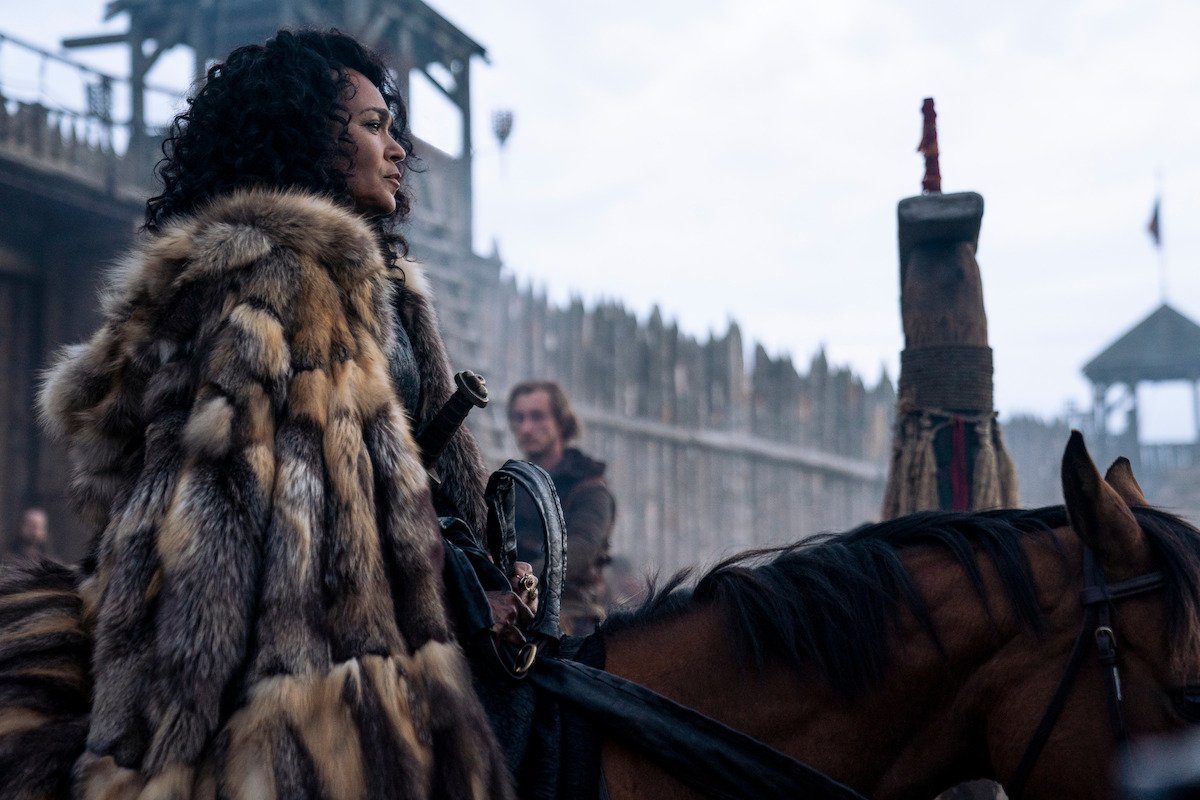
Who is your character based on and was she a real person? My character, Jarl Haakon, is a completely fictional character. She was not a real-life historical person, but that being said, she's probably inspired [by one]. The writers have done such a great, fascinating job creating her, and I think she must be inspired and based on historical characters, men [and] females.
Why do you think Vikings inspire interest around the world, across diverse cultures? I think Vikings are fascinating from a woman's perspective… the way I see it, since it was a thousand years ago. [Women] were so fierce and so strong and independent. We could marry, we could divorce, we could become shield maidens. We could go to war, we could raid, we could do all this stuff and then stuff happened. It's also fascinating that they travel all over the world. They traveled to Africa, Asia, [North] America, 500 years before Columbus. It's just so fascinating. Also, from a woman's perspective, what we were able to do, we were so empowered, and that power was taken from us actually. It's more relatable to look a thousand years back, than, for instance, 500 years back.
How were you inspired by the strong women of Scandinavia when portraying your character? Being Scandinavian, of course, there's a lot of inspiration because you learn about Vikings in school and Viking women, especially. I don't know if this is just me, but [I noticed] there's a lot of stuff about Vikings all of a sudden. [There is] a lot of literature about Vikings and the way they traveled and lived. I've done a lot of research to just get in touch, so I could do the character more authentically.
You have such a multicultural background. You're Swedish, and you've lived in Denmark for decades, and you have African roots. What does that mean for you as an immigrant and a Black woman? How does that expand your notion of what a Viking is or how you fit into that equation? I'm a mix of everything. I think I can really relate to Jarl Haakon, my character, because I [was] born in Stockholm, Sweden. My mother is Swedish, my dad is African American. We moved to the states when I was a little kid. We lived in Philadelphia, in New York for a while and then we moved to Paris, where my grandparents lived, and we came back to Sweden, and then I moved to Denmark. I think that gave me strength actually. As a child, I was a little bit confused, I must admit, but I think the character, I can really relate to her. I am Jarl Haakon, just, like, a thousand years on.
What would you say to those who say a Black woman can’t be a Viking queen? I would say that you should do your research, because [even though] Jarl Haakon is a fictional character, but most likely there [have] been people of color [who ruled]. We know that through DNA [and] research. We know for a fact that they mixed and traveled all over the place, much more than what we knew 100 years ago. Now we actually know, through science, that [Vikings] were really travelers and of course they mixed cultures and babies and knowledge and foods and slaves and, yes, of course, they were mixed. They were not this little isolated colony up north. There might have been a Black Jarl Haakon or a Russian Jarl Haakon or somebody from Asia or Native American, most likely. If you want to know about stuff, what really happened, there's so much research and interesting stuff that you can dig into.
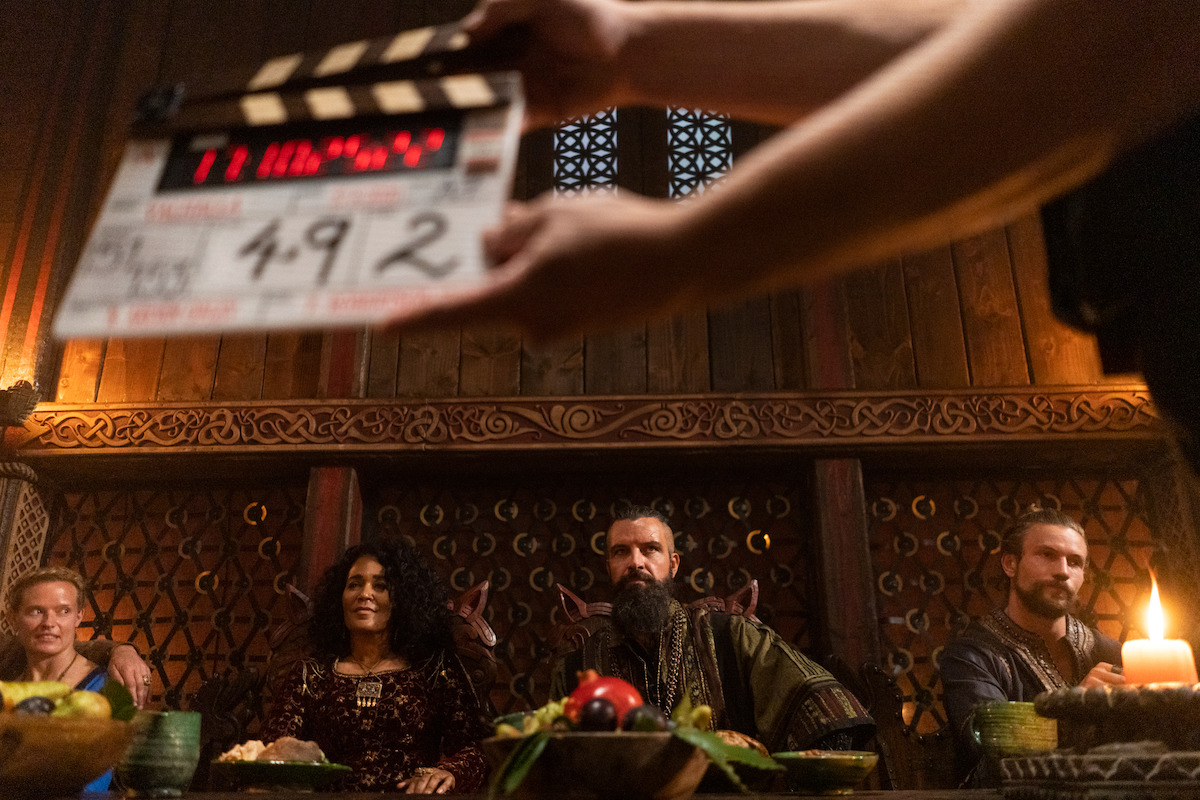
What processes did you do, both physically and mentally, to get into this character, other than the research? Did you have a Viking workout or a playlist or anything like that? We were shooting during the pandemic. It was very important for me to get in shape, because the clothes, they're really heavy. [And the] horseback riding, swords and stuff like that, it's not a walk in the park. It was just working out at least three times a week. Mentally, it was also a workout because the scale of the cast and the crew is enormous. You don't want to mess that up when extras and horses and cows and goats and there are 300 to 400 people, and you don't want to mess your lines up because everybody's had a long day and the weather conditions might be challenging. [In order to not have ] a nervous breakdown, you just really have to train yourself mentally [and say], “I can do this. I'm cool. I can do this. I can horseback ride. I can remember my lines. I know what to do next.” But that takes time to get into that state of mind, because it is intimidating to work on a set of this enormous scale.
What did you learn about yourself playing this character? I learned a lot from her actually, because she is the type of leader or person I would love to be. She's so tolerant, she's forgiving, she's loving and she's all about the cause. She's able to see people, she sees Freydis, she discovers something in her that Freydis doesn't even know [about herself]. The way she carries herself is so regal and so proud, even if she's had to battle through war and whatever. I think maybe that's the way I should carry myself a little bit more, and not get so angry at times. She's just so cool, calm and collected. She doesn't have to raise her voice, but then again, she has a shield-maiden army.
Your character's very spiritual. She explains her vision of the future for her countrymen to Freydis. What visions do you have for yourself, or, rather, what visions would you tell yourself as a young girl to prepare for the life that you have now? Oh my God. That's a huge question. If I could go back and tell my younger self, “You need to prepare, you need to blah, blah, blah... ” I would not have done probably 80% of all the stupid things that I've done, and I wouldn't be me. You learn so much while you go by, and you learn from your mistakes. You don't learn from the good things in life, I find. It's all the roads you shouldn't have taken, and that's why you grow; that's when you really become your authentic self. I think [Søren] Kierkegaard, the Danish writer, said, ["Life can only be understood backwards; but it must be lived forwards.]" It would be an easy ride for me to [tell myself what to do in the past], but I have to embrace my mistakes as well.
Your character seeks guidance from deities to help protect the people in her kingdom. What do you call upon to help you when times get tough? When times are tough, my go-to thing wouldn’t be sacrificing anyone anyway. It probably wouldn't be through Odin, Freya, that kind of paganism, but I am a spiritual person. And I think that sometimes you just have to stay put because usually life is challenging enough and there's ups and downs and sometimes you just have to stay on that surfboard and just go with the wave. Sometimes you can't fight it. I'm learning as I go, and I've tried and I've experienced so much in my life so far, so I know that when things are low, I go with the flow and when things are high I try to just grasp that as well.
This interview has been edited for length and clarity.


